Filter by
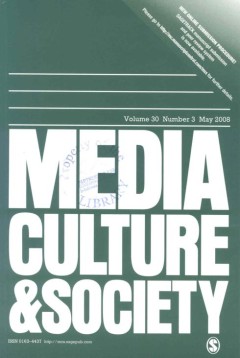
From liberalization to fragmentation: a sociology of French radio audiences s…
The last 30 years have seen a fragmentation of the radio station landscape in France. Since the 1980s, the liberalization of the French radio landscape has resulted in a strong trend towards the private youth music model of radio. But the process is neither a strict fragmentation by radio station or cluster of stations, nor a sharing out of listeners across all the nations. Such a structuring d…
- Edition
- Vol. 30, No. 2, Page 215-238
- ISBN/ISSN
- 0163-4437
- Collation
- -
- Series Title
- Media, Culture & Society
- Call Number
- -
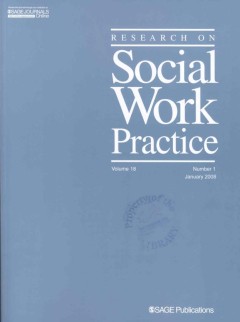
Evaluating the Use of Reflective Counseling Group Supervision for Military Co…
The purpose of this study is to examine the effects of reflective counseling group supervision (RCGS) for military counselors. A convenience sampling method is adopted. Twenty-two military counselors participate in this study. Both qualitative and quantitative research methods are used for collecting and analyzing data. The results support our hypothesis that participants who received the RCGS …
- Edition
- Vol. 18, No. 4, Page 346-355
- ISBN/ISSN
- 1049-7315
- Collation
- -
- Series Title
- Research on Social Work Practice
- Call Number
- -

The Quest for Evidence-Based Practice?: We Are All Positivists!
Throughout the history of professional social work in the United States, the field has embraced a positivistic view of science, a view continuing to be held by the mainstream of the profession. All social workers, to some extent, embrace the fundamental tenets of positivism. However, the rhetoric espousing positivistic science has not been matched by corresponding actions on the part of our pro…
- Edition
- Vol. 18, No. 4, Page 339-345
- ISBN/ISSN
- 1049-7315
- Collation
- -
- Series Title
- Research on Social Work Practice
- Call Number
- -

Implementing Evidence-Based Social Work Practice
Recently, social work has been influenced by new forms of practice that hold promise for bringing practice and research together to strengthen the scientific knowledge base supporting social work intervention. The most recent new practice framework is evidence-based practice. However, although evidence-based practice has many qualities that might attract social workers to adopt it, use in pract…
- Edition
- Vol. 18, No. 4, Page 325-338
- ISBN/ISSN
- 1049-7315
- Collation
- -
- Series Title
- Research on Social Work Practice
- Call Number
- -

Developing Evidence-Based Child Protection Practice: A View From Germany
The child welfare system in Germany has been described as family service-oriented because families in need are entitled to request family support services. If there is any form of child maltreatment, there may be some kind of mandatory state intervention to protect the child. Using trends in the number of children affected by maltreatment, the rate of maltreated children noted by the child prot…
- Edition
- Vol. 18, No. 4, Page 319-324
- ISBN/ISSN
- 1049-7315
- Collation
- -
- Series Title
- Research on Social Work Practice
- Call Number
- -

Applying Randomized Controlled Trials and Systematic Reviews in Social Work R…
This article elaborates on the centrality of interventions for social work practice and the importance of understanding the effects of interventions for a more efficient, harmless, transparent, and ethical social work practice. Low-bias research designs and meta-analyses are important means of generating the best possible evidence on what works in social work practice. An evidence-based practic…
- Edition
- Vol. 18, No. 4, Page 311-318
- ISBN/ISSN
- 1049-7315
- Collation
- -
- Series Title
- Research on Social Work Practice
- Call Number
- -

Practitioner Expertise in Evidence-Based Practice Decision Making
Evidence-based practice (EBP) is an orientation to practice that values evidence as a resource for clinical decision making while recognizing that evidence alone is never sufficient to make a clinical decision. Critics of EBP typically ignore, negate, or misrepresent the role of practitioner thinking processes and expertise in clinical settings. The authors believe that, far from being a mechan…
- Edition
- Vol. 18, No. 4, Page 301-310
- ISBN/ISSN
- 1049-7315
- Collation
- -
- Series Title
- Research on Social Work Practice
- Call Number
- -

New Proposals for Generating and Exploiting Solution-Oriented Knowledge
The claim that professional social work should be based on scientific knowledge is many decades old with knowledge transfer usually moving in the direction from science to practice. The authors critique this model of knowledge transfer and support a hybrid one that places more of an emphasis on professional knowledge and action occurring in the real world. The authors particularly focus on the …
- Edition
- Vol. 18, No. 4, Page 292-300
- ISBN/ISSN
- 1049-7315
- Collation
- -
- Series Title
- Research on Social Work Practice
- Call Number
- -

From Knowledge Production to Implementation: Research Challenges and Imperatives
As evidence-based practice is increasingly accepted in social work, the challenges associated with its actual implementation become more apparent and pressing. This article identifies implementation as a critical issue for research; implementation itself must be better understood if evidence-based practices are to be used and resultant improvements to practice are to be realized. Social work ne…
- Edition
- Vol. 18, No. 4, Page 285-291
- ISBN/ISSN
- 1049-7315
- Collation
- -
- Series Title
- Research on Social Work Practice
- Call Number
- -

Thoughts on the Use of Knowledge in Social Work Practice
The quest for making social work a discipline based entirely on empirical research findings is not new. In this article, the authors briefly review the field of social work in the United States during the past 100 years and discuss how the quest for the status of a profession forced the emphasis on empirical research. However, the authors claim that now and in the past, social work is a most co…
- Edition
- Vol. 18, No. 4, Page 278-284
- ISBN/ISSN
- 1049-7315
- Collation
- -
- Series Title
- Research on Social Work Practice
- Call Number
- -
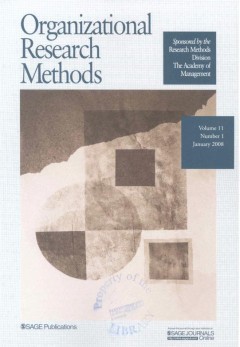
A Comment on Employee Surveys: Negativity Bias in Open-Ended Responses
Recent technologies have reduced some of the major barriers to capturing, coding, and analyzing qualitative data from survey respondents. This has prompted a renewed interest in including open-ended questions on employee surveys and a corresponding need to better understand the potential biases of personnel who choose to provide comments. The present study used data from a climate survey (N = 6…
- Edition
- Vol. 11, No. 3, Page 614-630
- ISBN/ISSN
- 1094-4281
- Collation
- -
- Series Title
- Organizational Research Methods
- Call Number
- -

Testing Equivalence in the Structure, Means, and Variances of Higher-Order Co…
Recent developments in the literature provide us with a better understanding of the importance of and procedures for testing measurement equivalence in organizational research. However, whereas many constructs in organizational research are multidimensional and multifaceted, procedures for testing the measurement equivalence of higher-order constructs are not commonly known. This study first di…
- Edition
- Vol. 11, No. 3, Page 593-613
- ISBN/ISSN
- 1094-4281
- Collation
- -
- Series Title
- Organizational Research Methods
- Call Number
- -
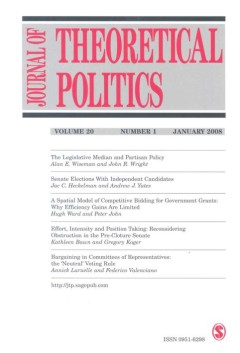
A Review and Examination of Demographic Similarity Measures Used to Assess Re…
Relational demography within groups, or an individual's demographic similarity to a group, is a type of cross-level theory labeled as an individual-within-the-group model. Previous researchers used three different approaches for measuring the core construct of demographic similarity: the difference score, interaction term, and perceptual approaches. This article provides an in-depth review of t…
- Edition
- Vol. 11, No. 3, Page 562-592
- ISBN/ISSN
- 1094-4281
- Collation
- -
- Series Title
- Organizational Research Methods
- Call Number
- -

Friends at Work: A Comparative Study of Work Attitudes in Seoul City Governme…
Managers and scholars have always been ambivalent about the value of friendships among employees to the organization, although anyone who has worked in an office setting knows that working in a friendly place is much more preferable than the alternative. The major focus on office friendship has been on the negative side: Friendship can be related to nepotism; favoritism; gossip; displacement of…
- Edition
- Vol. 40, No. 2, 147-169
- ISBN/ISSN
- 0095-3997
- Collation
- -
- Series Title
- Administration & Society
- Call Number
- -

The Emergence of Implicit Criteria Actually Used by Reviewers of Qualitative …
This article brings to light the actual evaluation practices of reviewers when assessing qualitative manuscripts. The authors conducted the first empirical research entirely based on reviewer reports for a journal on management sciences over a 28-year period. Content analysis of 474 reviewer reports written by 56 reviewers identified 19 critical points and 10 criteria, making up a synthetic tab…
- Edition
- Vol. 11, No. 3, Page 510-540
- ISBN/ISSN
- 1094-4281
- Collation
- -
- Series Title
- Organizational Research Methods
- Call Number
- -

Grounded Theory Method in Management Research: Users' Perspectives
The authors discuss the determination of quality in studies using grounded theory method (GTM). They concretely describe some misunderstandings associated with GTM and some malaises experienced with its orthodox application, drawing primarily on their own research experience and supporting their discussion with evidence from other researchers. They then confront their experience with current cr…
- Edition
- Vol. 11, No. 3, Page 430-455
- ISBN/ISSN
- 1094-4281
- Collation
- -
- Series Title
- Organizational Research Methods
- Call Number
- -
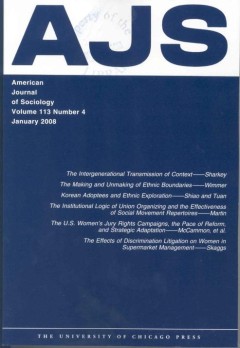
The Context of Discrimination: Workplace Conditions, Institutional Environmen…
This article explores the organizational conditions under which discrimination charges occur. Drawing on structural and organizational theories of the workplace, the authors demonstrate how organizational conditions affect workers’ and regulatory agents’ understandings of unlawful discrimination. Using a national sample of work establishments, matched to discrimination-charge data obtained …
- Edition
- Vol. 113, No. 5, Page 1394-1432
- ISBN/ISSN
- 0002-9602
- Collation
- -
- Series Title
- American Journal of Sociology
- Call Number
- -
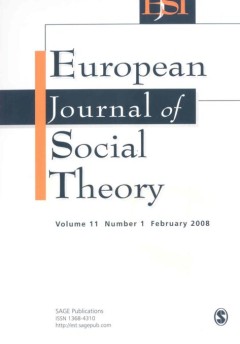
Mitteleuropa, Zentraleuropa, Mittelosteuropa: A Mental Map of Central Europe
The German term `Mitteleuropa' was coined to designate Central Europe at the time when the Habsburg monarchy exercised its domination over the Danube area and when the Eastern borders of the Reich proclaimed in 1871 were formed, thus from the end of the eighteenth century to the end of the First World War. Mitteleuropa constitutes an ambivalent `lieu de mémoire', a notion in which Central Euro…
- Edition
- Vol. 11, No. 2, Page 155-169
- ISBN/ISSN
- 1368-4310
- Collation
- -
- Series Title
- European Journal of Social Theory
- Call Number
- -
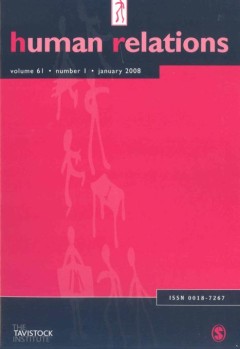
How much do you value your family and does it matter? The joint effects of fa…
Using identity theory and the gender role framework, this study examined the interactive effects of family identity salience, family-interference-with-work (FIW), and gender on two outcome variables: job satisfaction and job distress. Results from a sample of 163 employees support the proposed buffering hypothesis for job distress and job satisfaction, such that individuals who experienced a hi…
- Edition
- Vol. 61, No. 2, Page 187-211
- ISBN/ISSN
- 0018-7267
- Collation
- -
- Series Title
- Human Relations
- Call Number
- -

A study of the information needs of the users of a folk music library and the…
A qualitative study of user information needs is reported, based on a purposive sample of users and potential users of the Vaughan Williams Memorial Library, a small specialist folk music library in North London. The study set out to establish what the users’ (both existing and potential) information needs are, so that the library’s online service may take them into account with its design.…
- Edition
- Vol. 44, No. 2, Page 647-662
- ISBN/ISSN
- 0306-4573
- Collation
- -
- Series Title
- Information Processing & Management
- Call Number
- -
 Computer Science, Information & General Works
Computer Science, Information & General Works  Philosophy & Psychology
Philosophy & Psychology  Religion
Religion  Social Sciences
Social Sciences  Language
Language  Pure Science
Pure Science  Applied Sciences
Applied Sciences  Art & Recreation
Art & Recreation  Literature
Literature  History & Geography
History & Geography